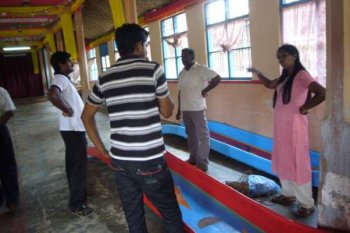Project Outline
In this project, various activities will be conducted to support religious leaders' efforts to rebuild communities in three designated regions (Phase I-III) of Sri Lanka (comprising 12 smaller regions). Committees of religious leaders will be established, education will be provided for young religious leaders, and various community activities (education in languages of other ethnic groups, exchange with people of other religions) will be carried out.
Implementation Plan
In the second year of the three-year project, the following activities will be carried out.
- Expansion of the community activities of religious leaders. (Phase I District)
Workshops for senior religious leaders will be held in June and November (2 days, 25 people), on topics such as promotion of mutual understanding between religious groups, conflict management, and non-violent methods for stabilization of regional society.
- Capacity building for young religious leaders (Phase II District)
Follow-up training will be provided for young religious leaders (3 days, 50 people) to build on the orientation training conducted last year.
- Community activities (Phase Ⅲ District)
- Civil Society Committees will be established in each of the 12 regions. Funding will be provided for community activities (150,000 yen per activity) proposed by people in the region.
- At civil society committee meetings, convened quarterly, plans will be drawn up to conduct community activities proposed by community members. The activities, and the feasibility of carrying them out, will be assessed by the committee. While the activities are being carried out, a monitoring officer will visit relevant regions as needed, to check on the activities and the usage of funds. After the activities have ended, an auditing committee will conduct an examination to ensure that the funds were used appropriately.
- Networking activities for religious leaders (Phase I, Ⅱ, Ⅲ Districts)
In order to plan and manage networking activities, the following four activities will be carried out.
- National convention of the committees of religious leaders (quarterly, 25 leaders per convention)
- Overall coordination meeting (April, October, 30 leaders per meeting)
- Island Center National Conference (March, 200 participants)
- Database construction (data entry and checking, two periods of 45 days)
Project Content
RAA national coordination meeting held in Jaffna on 02nd, 03rd and 04th of August 2011
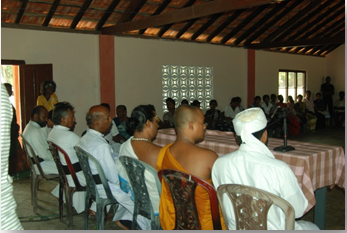
RAA national coordination meeting in Jaffna
Past years it was very difficult to organize meetings in Northern Province. Nowadays the situation is improving. The Sri Lankan government is removing most of the restrictions which they had imposed during the war period. With this change in the situation a lot of people from the south are visiting Northern Province to see important places where they had no chance to visit over the last three decades.
Nagadeepa is the one of the sacred place for Buddhist which belongs to Jaffna peninsula. Punkuduthiv is the entrance village to Nagadeepa populated by Hindus and Christians. They had no real clue about Buddhism and Buddhist culture. This has created more problems with in the village and visitors. So Punkudithiv village people have invited the Religious Action Alliance (RAA) through Sewalanka to held a program in their village to get a real understanding on all four major religions in Sri Lanka.
RAA accepted their invitation and arranged a workshop to teach and share the basics of four major religions and culture. It was a very successful program for villagers as well as RAA members. They have understood that this kind of program should be the model of the future programs to hold in Northern Province.
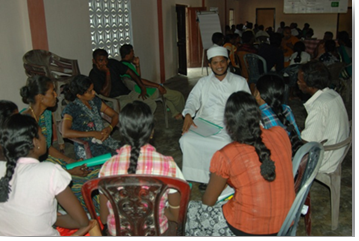
A religious leader meets the local people
Promotion of community activities led by religious leaders
The community activities referred to in the above title are non-profit activities carried out in a post-conflict context under the guidance of religious leaders. The aim of the activities is to resolve tensions between families (Sinhala and Tamil) and religions (Buddhism, Hinduism, Islam, Christianity). Ten such activities are planned for this project year. In Jaffna, a city in northern Sri Lanka, the following activities are now being carried out.
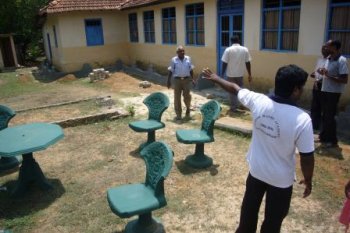
Community activity managers discuss arrangement of play areas
●Provision of Safe Play Areas for Children
Though the state of emergency decree was rescinded in September 2011, there are still countless soldiers carrying guns and ruined buildings riddled with bullet holes. In Jaffna City, there is almost nowhere that children can play in safety. In this project, slides, benches and other facilities will be built within the grounds of the community center, which forms a cornerstone of the daily lives of local citizens. These community activities will ensure the local children will have a safe place to play and develop into adults who can lead their communities in the future. Through playing with others, the children will learn the importance of give and take, and consideration for others. The Foundation hopes that through these activities, the children will experience interacting with other cultures at an early age, and learn the futility of interethnic and interreligious conflicts.
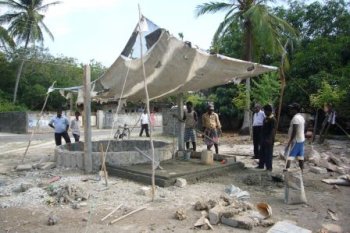
Restoration work on an old well
●Restoration of Wells to Provide Safe Water to Repatriated Refugees
With the cessation of the conflict, many refugees are returning to their homelands, and the provision of safe drinking water is becoming a major problem. However, waterway infrastructure in the country is underdeveloped, and wells in various regions have been damaged. Villagers travel as much as 10km to draw water from the few wells that still function. Through the community activities in this project, religious leaders hopes not only to restore broken wells and provide safe drinking water for local citizens, but also to promote the repatriation of Sri Lankan refugees. The work on the wells is, as it were, "priming the pump" for the repatriation of the refugees. The water from the wells will be supplied for free to Hindus and Muslims (the two major religions in Jaffna) alike, and religious leaders hope through this community activity to make the wells venues for exchange between two different cultures.
Islander Civil Society Network Festival
Over the course of two days from April 25, an event aimed at promoting exchange between different ethnic groups and people of different faiths was held at the Islander Center, a research institute of the Sewalanka Foundation, which is a recipient of an SPAF grant. Around 200 Sinhalese and Tamil followers of the Buddhist, Hindu and Islamic religions gathered together to build friendships between different cultures through exchange and to consider peace in the post-conflict era.
This event, entitled the "Islander Civil Society Network Festival", was originally scheduled for the end of March, but following the death of one of the central religious leaders the conference was rescheduled to take place after a one month period of mourning.
The term "islander" in the title of the research institute was chosen by the chairman of the Sewalanka Foundation Mr. Harsha Kumara Navaratne as a means to represent all the people of Sri Lanka as a single group. The name of the island, Sri Lanka, means "glittering island", however the origins of the word are Sinhalese. Thus, to the Tamil people, who have been at odds with the Sinhalese people for many years, it is hard to accept this Sinhalese word as a description of Tamil people. In light of this situation, Mr. Harsha, who has long worked for ethnic reconciliation, came up with the term "Islander" as a word that would be acceptable to all inhabitants of the island.

As the Islander Center lies near the national park, a great many species of plants and animals inhabit the nearby area. The surrounding skies are filled with flocks of peafowl and parrots, and the lakes offer opportunities to spot crocodiles.
●
Morning activities
The program started at 6AM each day with one hour for Shramadana, or "shaved hour". Participants divided by region to help clean with the center, grounds, kitchen, etc. Morning Spiritual Sessions were organized by the clergy network. Participants could choose from 6 stations: Ganesh puja, pirith chanting, yoga, meditation, Christian hyms, and Muslim prayers.
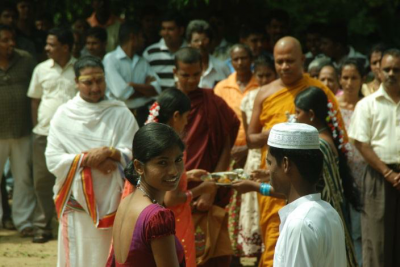
Buddhist, Hindu and Islamic leaders preach ethnic fusion
●Training content
Two hour learning sessions were held in the morning and afternoon on both days, and could be attended at will by all participants.Options included discussion groups, firms, demonstrations, and interactive training programs. Each station had facilitators and translators, and all programs were conducted in both Shinhara and Tamil. By the end of the program, each participant attended 4 of the available 10 programs.

A scene from the learning sessions: (Left: Peace Program, Right: interpreters and facilitators assist the training)
●Nighttime events
From six till ten at night, a market fair and cultural exchange events were held. A number of stall strongly reflecting the ethnicity and regionality of the participants were lined up the garden of the Islander Center, and agricultural products, clothing, household goods and planting materials made in various regions around the island were on display. A cultural exchange event was held alongside the market fair, where traditional folk dances and short dramas were performed. On the final night, priyes were given for the best stalls and the best community products.
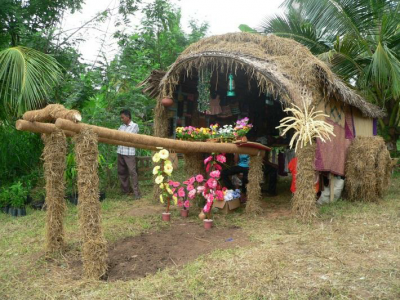
Stall using natural materials to display community products
Project Results
| Implementing Agency |
Sewalanka Foundation (Sri Lanka)
|
Year |
Implementation year(2/3) |
| Project Type |
Self OperatedGrantCommissionedOther |
Year project budget implementation |
10,895,850yen |




